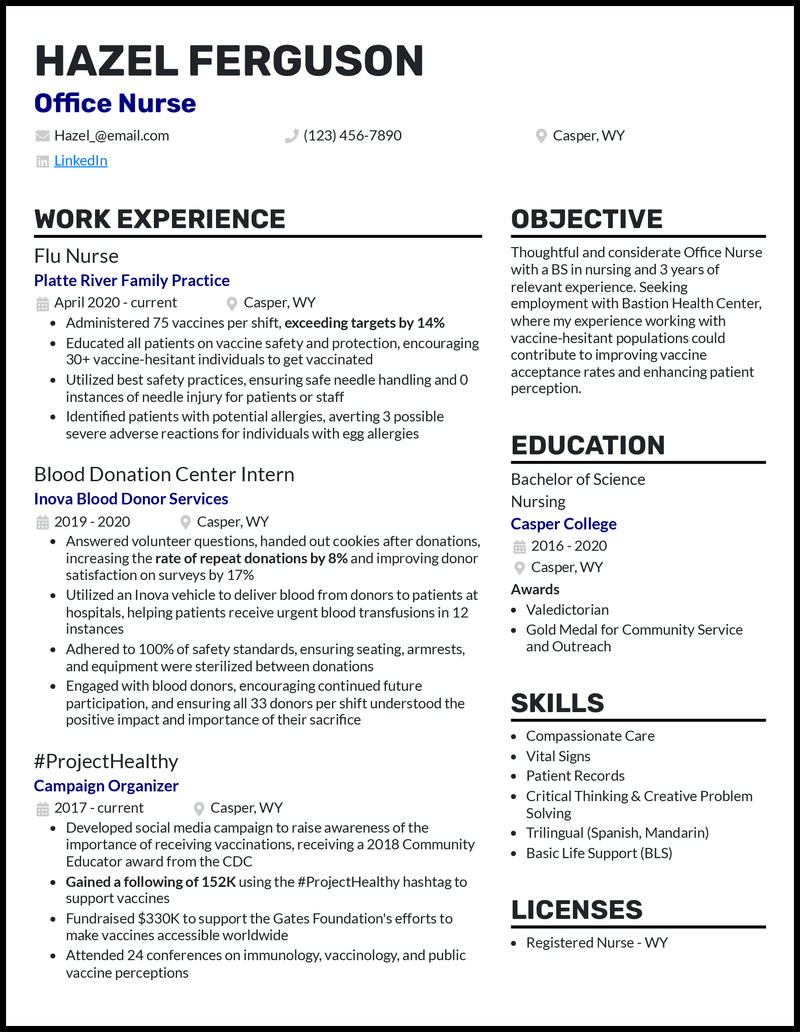You know how to efficiently triage patient care when patients walk through the clinic door. You’re great at collaborating with physicians, other medical professionals, and patients to ensure the best end-to-end patient care possible.
So how do you effectively highlight your diverse skills on your office nurse resume?
That’s where we come in. We’ve helped office nurses from various specialties update their resumes and writing cover letters to land their next job.
These office nurse resume templates serve as a guide to provide a launch point for you to create your own.
Why this resume works
- Picture the recruiter drowning in a sea of office nurse resumes. Naturally, they’ll be quick to dismiss candidates without any stand-out achievements. A side section in your resume highlighting your industry-specific credentials and accolades could be your saving grace.
- So, you have a nursing license – flaunt it like nobody’s business. But then, can you recount those awards you won in college for being a brilliant and empathetic student with impressive qualities befitting an exceptional nurse (cue 2018 Community Educator award from the CDC)? They deserve a spotlight, too.
Related resume examples
What Matters Most: Your Skills & Work History

To land an interview, you need to showcase you have the qualifications recruiters want. That’s where your skills, such as medical assessments and immunizations, and your work history, whether you worked in a hospital or private practice, come into play.
Your skills and work history are the key to determining whether you’ll land an office nurse interview or your resume will go in the trash. So how do you ensure you land an interview?
You’ll more easily catch the recruiter’s eye by ensuring the skills on your resume align with those in the job post.
Here are the most common skills recruiters look for in an office nurse:
9 top office nurse skills
- Outpatient care
- Medical assessment
- Patient intake & triage
- Vaccinations
- Medical insurance
- Vital signs
- HIPAA
- Diagnostic testing
- Health clinic software
Sample office nurse work experience bullet points
Now that the recruiter is clear you have the job’s minimum qualifications, it’s time to make your resume stand out.
Generally, the goal is to provide as much quantifiable data as possible. As an office nurse, your soft skills, like compassion, thoughtfulness, empathy, and communication, are just as important as hard skills, like understanding vital signs and medical software.
On your office nurse resume, you want to balance and highlight your historical impact using both types of skills.
Here are a few samples:
- Administered 75 immunizations per shift, exceeding targets by 4%
- Educated all patients on COVID-19 safety and protection, encouraging 57% of vaccine-hesitant individuals to get vaccinated
- Developed and implemented a new patient triage process through collaboration with front desk staff and physicians, improving patient ratings by 12% over three months
- Attended monthly local charity events to fundraise just over $400K in under six months, making it possible to offer hygiene training and supplies to underprivileged children as part of our local community outreach program
Top 5 Tips for Your Office Nurse Resume
- Showcase your ability to coordinate and collaborate
- An important aspect of an office nurse’s role is coordinating and collaborating with people from all walks of life. Highlight your ability to work with the myriad of people and departments an office nurse encounters on the job.
- Focus on your impact
- Your resume needs to show how successful you’ll be on the job, which means going beyond merely listing your past job duties and responsibilities. For true impact, provide specific accomplishments and data about your past successes, like how you trained 10 new hires on triage procedures or developed a streamlined intake process that improved patient ratings by 3%.
- Focus on your expertise
- Office nurses tend to wear several hats when they work in general practice. To make your resume stand out, highlight your specific areas of expertise that most align with the job description. For example, do you have a specialization, certifications, or shine at patient triage or diagnostic test interpretation?
- Update your resume for each job application
- Take 10 to 15 minutes to update your resume for each job application you submit to increase your chances of getting noticed. Review the job description and make sure any listed hard and soft skills you possess, like HIPAA compliance and diagnostic testing, are included.
- Forgo the career objective
- A career objective rarely adds value to your resume, so it’s better to leave it off unless you have a specific reason to include a career objective, like highlighting your desire to switch specialties or an upcoming relocation. Otherwise, it’s better to use the real estate it would take up for more valuable information, like a nurse educator or medical assistant certification, that sets you apart.
Of course, you want to include your name and contact information at the top of your resume. But, beyond that, keep it simple and include your work history, education, and skills. If you hold certifications, like Certified in Executive Nursing Practice (CENP) or Family Nurse Practitioner Certification (FNP-BC), it’s also good to include those in your education section below your degrees.
Keep your resume to one page by focusing on achievements and skills most closely related to the office nurse role you want, such as developing and implementing an ongoing infection prevention and control program or closely monitoring high-risk patients to identify progress and medication side effects. If you’re an experienced office nurse practitioner with varied work experience that spans more than 10 years, it’s okay for your resume to be up to two pages, but not longer.
The reverse-chronological format works best. It helps you list recent, relevant office nursing experience first, while older, lesser relevant jobs, like medical assistant work or RN clinical experience, are listed at the bottom.








